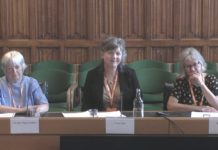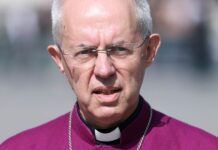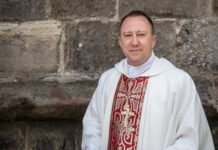At its June 8-11 virtual meeting, The Episcopal Church’s Executive Council doubled down on the church’s anti-racism efforts, acknowledging in light of recent events that the church must do more, both to understand its own complicity in white supremacy and to dismantle it.
In order for that to happen in a mostly white church, there needs to be a paradigm shift, said House of Deputies Vice President Byron Rushing. During his meditation for Morning Prayer on the final day of the meeting, Rushing shared his perspective as a black man being acutely aware of racism every day, and challenged white members of council to have the mindset.
“We can’t be honest about doing this work together until it is as equally important, every day, for you as it is for us, and that each of us know that,” Rushing said.
Council passed several resolutions affirming the church’s racial justice work, emphasizing efforts to respond to the recent killings of black Americans by police and white vigilantes and highlighting the disproportionate impact of COVID-19 in communities of color.
One resolution will send $150,000 to the Episcopal Church in Minnesota and $150,000 to the Diocese of Kentucky to “support their continuing work of dismantling the systemic racism we have create in this country and still permeates our church and society.”
George Floyd, an unarmed black man, was killed May 25 in Minneapolis, Minnesota, while being detained by police. Officers pinned him to the ground for nearly nine minutes while one pressed his knee into Floyd’s neck as he repeated, “I can’t breathe.” That killing prompted protests nationwide and around the world denouncing police brutality. Protesters also have drawn attention to the March 13 killing of Breonna Taylor, a black woman fatally shot in her Louisville, Kentucky, home by police who were executing a “no knock” warrant.
By providing substantial assistance to the dioceses that are responding to those two high-profile killings, Executive Council shows it is listening to Episcopalians who expect their church to take concrete action in opposing systemic racism, the Rev. Gay Clark Jennings, president of the House of Deputies, said June 10 during a committee discussion.
“The church is waiting for us,” she said, adding that this emergency spending is offered to the dioceses with no strings attached. The bishops will decide how the money can best support racial justice work on the ground.
Rushing also praised the work of the dioceses of Georgia and Atlanta in responding to the Feb. 23 killing of Ahmaud Arbery, a black jogger who was attacked and fatally shot by a white father and son in Glynn County, Georgia. Rushing and other church leaders chose not to include those two dioceses in the emergency funding, partly because the dioceses’ continued efforts don’t appear to depend on new spending.
“They’ve done a tremendous amount of work, and we know where they are,” Rushing told the Joint Standing Committee on Mission Within the Church.
Rushing also helped draft two resolutions that reaffirmed The Episcopal Church’s commitment to racial justice work after the killings of Arbery, Taylor, Floyd and other black victims. One of the resolutions singled out Arbery’s killing as a case of “violent racial vigilantism” that brought to mind lynchings and other historic forms of racial terror. Arbery’s attackers, who said they thought he was a suspect in a series of recent break-ins, were not arrested in the killing for more than two months.
Executive Council “praises the prompt response of the Episcopal people and churches in the Dioceses of Georgia and Atlanta to publicly call for justice in response to this heinous crime,” the resolution says.
A parallel resolution focuses separately on cases of deadly police violence toward African Americans, citing Floyd and Taylor by name and praising the response of Episcopalians in Minnesota and Kentucky. It also calls on all Episcopalians “to organize, advocate, and dismantle systems, policies, and practices that reinforce police violence and brutality.”
Executive Council approved another resolution that outlines specific criminal justice reforms that would improve police accountability and help protect people of color from violence. The resolution encourages Episcopalians to advocate for the reforms, including bans on chokeholds, stricter protocols on use of force, creation of community oversight bodies and federal review of killings by police.
“Working to enact these policies is not a means to an end but one part in addressing systemic racism and providing long overdue protections to communities of color, ensuring that we live in a society that recognizes, values, and empowers all of God’s children,” the resolution concludes.
When it was brought before council, the Rev. Devon Anderson of Minnesota noted that the resolution seemed to preclude any of the various proposals that fall under the umbrella of “defunding the police,” but ultimately offered her support, and the resolution passed easily.
Another resolution addresses the toll that the COVID-19 pandemic has taken on communities of color, including Indigenous communities, often because of barriers to adequate health care caused by poverty. Executive Council urged Episcopalians to “join with their communities in actively removing these barriers and addressing the social determinants of health.”
The pandemic and national outrage over police brutality toward people of color also prompted Executive Council to adopt a new program of “rapid response” grants as part of its core racial reconciliation initiative, Becoming Beloved Community. Episcopal and Episcopal-affiliated entities are encouraged to apply this summer for grants of up to $10,000 to back immediate efforts “to address systemic racism and racial violence.” Executive Council approved up to $100,000 for those grants.
While anticipating that the coming years will be some of the worst the U.S. economy has seen since the Great Depression, the Rev. Mally Lloyd, chair of the Joint Standing Committee on Finance, assured council that the church is in “solid financial shape.” Short-term reserves are above their targeted amount, with $12 million in unrestricted funds immediately available, and 2020 expenses are below budget so far.
However, Lloyd and Treasurer Kurt Barnes warned that while income in the first quarter was not seriously affected by COVID-19, they do not expect that to continue. Several dioceses have asked to defer their assessment payments, and two have requested emergency hardship assessment waivers. Council passed a resolution granting a full waiver of Colombia’s assessment and a partial waiver of the Dominican Republic’s assessment. That resolution also granted a partial waiver to the Diocese of Dallas as it works toward a full 15 percent payment in 2021. In addition, the Diocese of Honduras requested financial assistance, as its schools – which are its primary source of income – are now closed, but teachers are still being paid. Council approved a $50,000 grant for two months of payroll and asked the presiding officers to appoint a short-term task force to work with the diocese on financial sustainability.
In light of expected income shortfalls from diocesan payments and investments, church staff were asked in April to identify immediate savings that could be implemented without personnel cuts. Staff identified $4.2 million in potential savings, and the finance committee went through the 2020 budget with those recommendations and other circumstances in mind. The committee ultimately put forward a resolution to make about $2 million in immediate budget cuts, much of it “low-hanging fruit” like travel expenses that are now moot. This sets a baseline for deeper cuts to be made as needed, in a “staged reduction” approach depending on how much income might decline.
Lloyd praised church staff and the committee for their work on the budget, which she said struck a balance between saving up for an uncertain future and using the church’s resources now to address the immediate crises of racism and COVID-19, with a nod to the Biblical story of Joseph.
“Are we in the stage of building and filling the barns against the future famine, or are we in the famine? … We’re in the cusp, I think.”
Council is next scheduled to meet Oct. 9-12, and further budget discussions – as well as possible changes to the 2020 parochial report – are expected.




“In light of expected income shortfalls from diocesan payments and investments, church staff were asked in April to identify immediate savings that could be implemented without personnel cuts.”
I have an idea…………..end the lawsuits!
Actually, I think they must include staff cuts. That is often times the biggest single cost. Not only that, but the mindset behind a bloated staff list also leads to unnecessary costs in other areas.
Oh absolutely there will be staff cuts…..lower level staff. Most Church personal expenses account for ~80% of spending and it ain’t no different at 851. This was just blather for public consumption before the actual cuts come.
“The Episcopal Church’s Executive Council doubled down on the church’s anti-racism efforts”…………………I wonder if they will build a memorial to the elderly white couple who were murdered by the black assassin while they visited their son’s grave in a Delaware cemetery a few weeks ago?
Or for David Dorn, the police officer killed in the riots?
Is TEC still 92 % white? It surprised me the last time Northern California was seeking a bishop this was the percentage. The barrio used to be south of Mission St. in San Francisco. That’s walking distance to Grace Cathedral. Just saying.
Spot on, RH. Despite having a black man as a figurehead leader, TEC is far “whiter” than most other churches. This whole thing is bizarre.
White supremacy. This wasn’t a “thing” even ten years ago. People just have to invent scary bugbears to campaign against.
While I certainly agree that white supremacy has no place in the church, I would ask TEC’s executive council to consider the following ACTIONS which could begin to repair the damage done by TEC and/or for its benefit-
1) Discipline the clergy and administration of TEC who have made racist jokes and remarks about Global South primates, bishops and clergy. This was part and parcel of TEC meetings in the 1990-2009 period and common in internet “commentary” until quite recently.
2) Return TEC’s property on Manhattan Island (ie- the $6 billion of property of Trinity Wall Street and its various secular entities). This property was stolen from the indigenous population and given to the Church of England and came into TECs possession when it took all CoE property in the US.
3) Many of the churches and other buildings in the southern US were built with slave labor. Compensation should be provided (at skilled labor rates, plus the accumulated interest since the date of construction), and TEC’s complicity acknowledged with plaques on the buildings.
4) Likewise, churches in the northeastern US, built in the 17th through 19th centuries, with donations from slave traders, should provide compensation.
If they are serious, they will take actual action, and repay bits of their billions in assets to the heirs of those whose lives and labor were stolen for TECs benefit, rather than repeat their calls for others to take action, and for the US taxpayers to pick up the tab for reparations.
I am sure everyone felt better after passing some resolutions. Pretty much the same resolutions for 60 years now. How’s that working out?
I don’t think throwing money at leftist foundations and organizations is going to solve “racism.” That’s not “work,” it’s virtue signaling. Efforts to eliminate above-the-shoulder police restraint holds and no-knock raids have merit and should be pursued. Police unions should be encouraged to work to remove rogue police officers and re-train officers to prevent these outrages by a few, which stain the reputation of all. “Racism” is eliminated only one heart at a time, as people of all races treat other people they encounter with the same respect and compassion they ask for themselves. Requiring individuals to confess sins they haven’t committed is not constructive.
On COVID-19, this is a medical issue of great concern. All Americans would benefit, I believe, from eating fewer refined carbohydrates in general and sugar in particular. Conquering our addiction to sweets would bring rates of obesity, hypertension, and Type 2 diabetes way down. People who have these conditions are much more vulnerable to the coronavirus. And, for all Americans, but for black Americans especially, we need to increase our levels of Vitamin D. More and more studies are emerging showing this is crucial to prevent severe cases of COVID-19. I am not convinced that access to health insurance is the key problem here.
Nothing like “a nod to the biblical story of Joseph” to help everyone sleep better at night. What about a “nod to the biblical story of God’s imminent judgement” – specifically on haters of Christ and His gospel, opponents of God, who rampage in the streets in lawless mobs, destroying property, injuring others, and endangering lives? What about a “nod” to Psalm 2?
Quite ironic, considering that TEC tends to be particularly dominated by whites (despite the token black Presiding Bishop), whereas ACNA is mentored by many overseas African leaders, and contains many local Nigerian congregations!